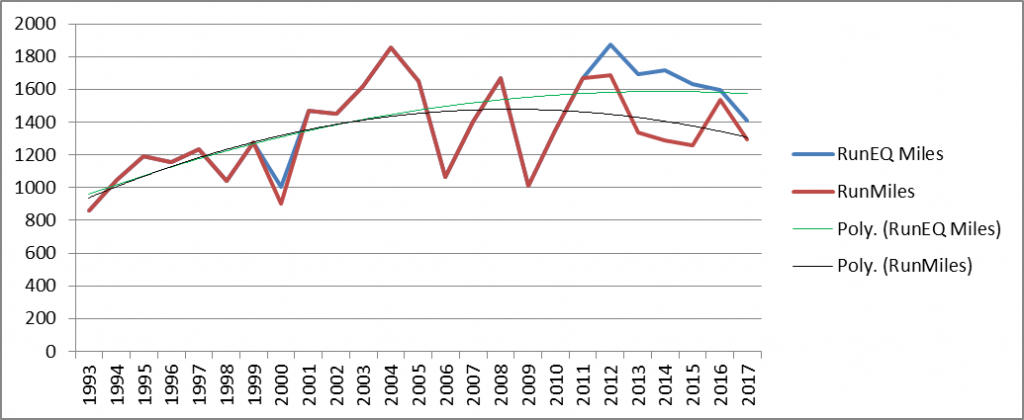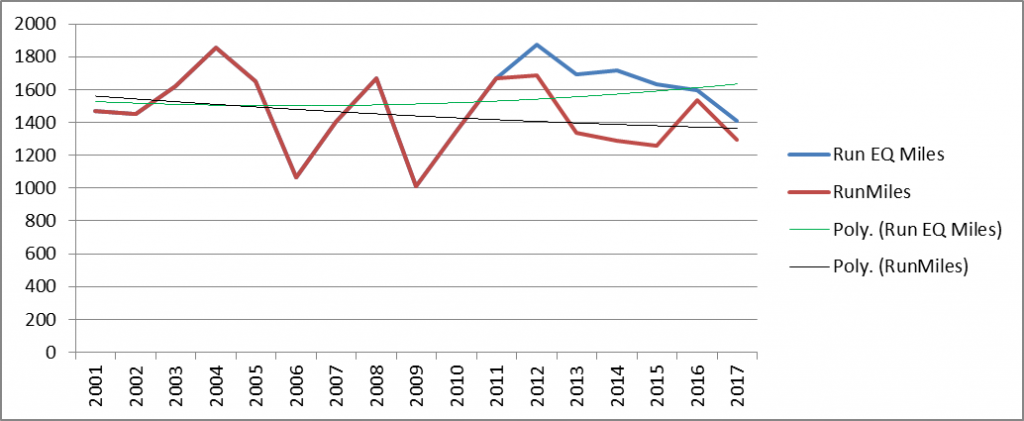Like most runners, as I get older my declining ability makes it harder to stay motivated. So I tell myself stories to keep going, to make the effort to struggle against the encroaching shadow of age seem worthwhile. The other day I came up with a good one.
Inevitably, as we age, we all get slower and more prone to injury. But runners have some control over how that happens. We might choose to struggle keep running as fast as possible, keep plenty of speedwork in the mix, and not run as many miles as we used to. Or we can choose to keep our mileage totals up.
Distance is much more under the runner’s control than pace. As Amby Burfoot says, “Nobody talks much about the ‘distance is easier’ thing,” but you can always add miles (within reason) by slowing down, while you can’t just choose to be even faster.
I’ve tended toward the maintaining distance option, in part because I’m still trying to run longer races, in part because speedwork has always made me more injury-prone, and in (large) part because it’s bad enough getting slower, but I’d hate to watch my mileage totals shrink too. So my average pace has dropped farther than it might, but I keep my weekly mileage up, more or less.
During one run, I thought about how all those things link together: Pace is distance divided by time. “Well, duh,” you say, and rightly so.
Now apply some simple math and solve for time instead: pace x distance = time spent running.
Take two runners. Back in the day, both of them averaged about 8 minutes per mile and 40 miles per week. As they got older, Runner A strived to keep running as fast as possible. Today, she’s still running 8:30 min/mi., but only 35 mpw. Meanwhile Runner B kept his mileage at 40mpw by slowing to 9 minute miles.
Do the math. Both runners started by running 320 minutes a week (8 x 40). Runner A has probably retained more speed, but she now runs for only 297.5 minutes a week. Meanwhile, Runner B spends 360 minutes running every week.
Or should I say, “Runner B gets to spend 360 minutes running”? By that measure, Runner B’s running has actually improved!
OK, that’s not the deepest insight ever. But when your log keeps telling you the work isn’t paying off the way it used to, any alternative viewpoint is welcome.
Let’s look at a less concrete example, me. Here’s a chart showing my yearly mileage totals since I started distance running (and regular logging) back in 1992:

There’s a Rule of Thumb that says no matter how old you are when you start, you’ve got about 10 years of improvement ahead of you. That was true for me – started my post-school running career in my early 30’s, ran my first marathon in 1993, slowly built up my mileage until I finally qualified for the Boston Marathon at age 40, and then ran my PR at Cape Cod later that year.
If I clip off the early years, leaving the years from my ‘peak’ until now, the resulting chart looks like this:

Like most non-elite runners, my total mileage rose and fell based on my changing goals, injuries, and other things going on in life. The charts include trendlines (2nd order polynomials for the nerds reading this) to help smooth out the peaks and valleys and simplify how I’ve changed over time.
Back then, when I was averaging 8 minute miles, I was running five days a week and about 30 mpw. That’s 240 minutes. Today I’m down to four days a week, 27 mpw at 9 minutes per or so. That’s 243 minutes, just about the same. I may be older and slower than ever, with the trend getting worse, but by total time I’m running as much, if not more, than ever before.
The true picture is actually better than that. Like many older runners, a few years back I started doing more biking and other cross-training. I still wanted one simple number to track my total weekly exercise, so I used conversion factors I found online to combine biking (and other things, but mostly biking) with my running to get a weekly total of running-equivalent (RunEQ) miles.
I use a conservative estimate of 4 bike miles equals one running mile. As you can see in the chart, when you use RunEQ totals instead of just running miles, the trendline doesn’t drop over time. So by that measure, and given how I’ve slowed down, I’m putting in about a half-hour more per week than I used to.
Even better, since I average about 15mph on the bike, each mile takes about 4 minutes. So it takes 16 minutes to ride the 4 miles that make up one RunEQ mile, even longer than it takes me to run that mile. I get to spend even more time exercising than I would if I were just running!
Is giving up speed to be able to run for a longer time a good choice? That depends how important race results are to you. I’m certainly not someone who thinks a 5 hour marathon is better than a 3 hour marathon because you get to spend more time enjoying the fun race environment. On the other hand, running for a longer time instead of trying to faster might not only reduce the time you spend off due to injury, but keep you healthier overall. Most studies of how exercise helps older people show that the more time you spend exercising, the longer you live.
I don’t know about you, but as a non-elite runner, given the choice between finishing my last Boston Marathon at age 60 in 6234th place instead of 7983rd or running, albeit slowly, at age 70 or 75, I’ll take the latter every time.
So as I trudge along at my declining old-man pace, I can take comfort in the fact that I’m still running more than I used to by at least one important measure. I’ll keep slowing down, but as long as I keep up the miles I get to spend more and more time doing what I want to be doing, running.

I absolutely love this! I didn’t START running until the age of 51. I was slow then and I am slow now. But I’m happy to say I’m still moving! I’m 56 now and am encouraged I might have five years of improving my speed ahead of me. Ha! Heading over to read that article now. Thanks for sharing!
Hi Ray….I’m 66 and going strong after 43 years running. It’s been a long time since running my first Boston in 1980, but several weeks ago I ran a trail 50K here in Texas, 2nd over 60…so keep on keeping on!
I’m running 5 days a week, around 35 mpw.
My goal is to be winning my age group at races by attrition. On that front, I’m still making progress.